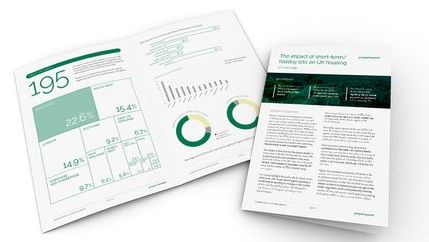
If approved, the changes will be introduced through secondary legislation under the Levelling Up and Regeneration Act 2023.
Scotland and Northern Ireland already have short-term let (STL) licensing schemes in operation, and Wales is introducing a statutory licensing scheme for all visitor accommodation providers.
Housebuilding remains the real solution
Propertymark’s intensive research has demonstrated that property agents see increased construction of homes in the private and social sectors as the primary solution to problems caused by increasing numbers of STLs.
However, regulation to limit the number of STLs and ensure a level of regulatory playing field with the private rented sector is a close second to this solution. We have lobbied for the introduction of a licensing scheme with physical checks for STL premises as well as extending the current health and safety requirements and tenant protections to short-term lettings.
Planning and permitted development
Under proposed planning changes a new ‘use class’ will be created for STLs which are not used as a sole or main home, and any future STLs will have to apply for planning permission before they can take bookings.
Homeowners who let out their main or sole home for up to 90 nights a year can continue to do so without needing permission, and existing dedicated STLs will automatically be reclassified into the new use class and will not have to make a planning application.
Associated permitted development rights are also part of the proposals – one allowing for a property to be changed from an STL to a standard residential dwelling, and a second that would allow a property to be changed to an STL. Local authorities would be able to remove these permissions and require full planning permission if they deem it necessary.
These measures are focused on STLs only, and will not affect hotels, hostels or bed and breakfast accommodations.
More details of the register to be announced
The UK Government is still working on details of the new mandatory register, stating they want to avoid disproportionate regulation of homeowners who let out their main home infrequently.
However, in the introduction to their consultation on the registration scheme, the Department for Culture, Media and Sport stated that a register would provide data that would help local authorities manage the housing market impact of high numbers of short-term lets and apply and enforce the use class changes.
The register is also intended to help drive adherence to standards and provide a platform to address negative community effects, such as anti-social behaviour.
Striking a local balance
STLs offer property owners high yields, flexibility to use their property how and when they would like, and a reduced regulatory environment compared to the PRS. Our member agents told us many times that the high rents paid on STLs are a key incentive for owners to let in this market.
We have long called for parity between the short-term and residential lettings. Not only would this ensure STLs meet the same standards as other rented properties, but it could also help to address supply issues within the PRS.
Short-term lets provide flexibility for property owners and give tourists more accommodation options, but this should not prevent local people from being able to buy or rent homes in their area.






